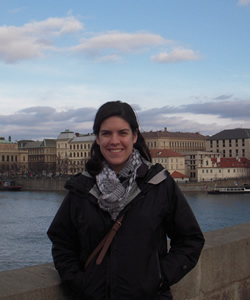
Caroline Holkeboer on the Shaping of a People: Religious Participation in a Post-Communist World
March 7, 2011
On a recent evening in Prague, my Jewish history professor invited us over to his place for dinner. His apartment is situated off Wenceslaus Square, and the building itself is a historic shopping passage built around the turn of the century. During the previous class, our professor had instructed us to meet him in the front hallway of the building. As I stood at the meeting point, I looked up and saw a statue hanging from the ceiling of a man riding on an upside-down horse. It seemed oddly familiar to me and when our professor came downstairs he explained that it had been created as a parody of the famous statue of St. Wenceslaus, situated just outside the building in Wenceslaus Square.
For me, this statue, offers an interesting commentary on the state of religion in the Czech Republic and other post-communist countries in Europe. Since arriving in Prague, I have been astounded by the unmasked secularism of not only the people, but also the establishment. It is true that most of Europe has experienced a similar trend towards secularism over the course of the last century, but perhaps Prague can serve as a case study for the impact that totalitarian regimes and political repression have had on the course of religion and faith for an entire people.
As a city, Prague has a dynamic religious history. In 1355, it became the capital of the Holy Roman Empire when the Bohemian King Charles IV was elected as the Holy Roman Emperor. Under his direction, Prague flourished as a financial, religious, and cultural center. Then, in 1415, controversy arose when Jan Hus challenged the precepts of the Roman Catholic Church. From the pulpit, he questioned the misuse of ecclesiastical funds and called for the extension of the Holy Eucharist to all lay people. His heretical claims placed him before the Council of Constance, and as a result, he was condemned and burned at the stake in 1415. News of his death mounted violence between his followers and the Catholic Church in the Hussite Wars from 1419 to 1436.
Although violent in nature, this reform movement marks the beginnings of religious dialogue within the Czech lands and remains an important landmark in Czech history today. In fact, the Czechs proudly claim the Hussite revolution to be the roots of the Protestant Reformation in Europe, as it occurred some 100 years before Martin Luther nailed the 95 theses on the door of the Wittenberg church in 1517. Although a period of re-Catholicization followed, the Church remained an important institution for the people of Bohemia and the Czech lands. In addition to Christianity, Prague has been host to a large Jewish population, beginning in the ninth century. During the medieval ages, many Jews found solace under the protection of the ruling king and established a vibrant Jewish community. This is not to say that the Prague Jews were insulated from anti-Semitism and discrimination. In fact, quite the opposite, but regardless, a thriving religious community developed.
This religious history stands in stark contrast to the current absence of the Church and religion in the Czech Republic. Today, between 60 and 80 percent of Czechs consider themselves to be atheists. Two major political events have contributed to the decline of religion. First, Nazi occupation beginning in 1938 resulted in the mass deportation of thousands of Jews from Czechoslovakia, Moravia, and Bohemia. The removal of the Jews to the ghetto in Terezin, Czechoslovakia and their eventual transfer to Auschwitz-Birkenau completely decimated the Jewish population in Prague, a reality that is very apparent in the nearly empty Jewish Quarter today.
Second, the rise of communism in Central and Eastern Europe, under the direction of the Soviet Union, silenced religious participation and freedom in the Czech Republic. When allowed to conduct services, priests and ministers were expected to convey the message of the state and were also kept under strict surveillance. Religious attendance dwindled and people mainly kept any religious devotion to themselves. The remnants of this political environment are present today, even 21 years after its demise, demonstrating the monstrous impact that a regime can have an entire culture and nation. I am sure that my time here in the Czech Republic will continue to reveal this impact, particularly as I engage more with the people around me and get to know the older generation, who lived through the oppression, and the younger generation, who is deciding what the Czech Republic will look like for generations to come.
About the Author
Opens in a new window
